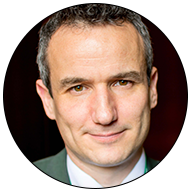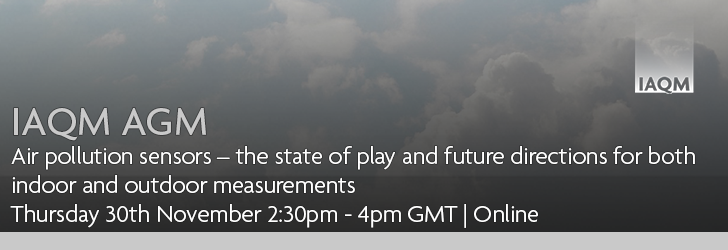Join us for the IAQM's 2023 virtual Annual General Meeting (AGM)! They will be announcing the results of the IAQM Committee election.
You will have the opportunity to hear about the IAQM’s strategic direction, activities over the past year, and welcome your new Committee members.
The AGM will be followed by a keynote speech from Professor Francis Pope:
Air pollution sensors – the state of play and future directions for both indoor and outdoor measurements
Air pollution sensors have caused a paradigm shift in air quality monitoring for several air pollutants. In this presentation, Francis will discuss the good and the bad of air quality sensors. He will present his view of where low-cost sensor technologies could go in the future. In particular, he will provide a roadmap of how air quality sensors can be combined with other Internet of Things (IoT) sensors and how this will enable better air quality management. The differences between the monitoring of indoor, outdoor and commuting environments will be assessed. The combination of data streams from these different environments will provide a much better understanding of personal exposure, and the approaches that can be taken to reduce exposure both within regulatory and personal environments.
Event schedule
14:30: AGM, including update from IAQM Chair Chris Rush
15:00: Keynote speech from Professor Francis Pope
15:40: Discussion
16:00: Plenary and Close
Our Speaker
 Professor Francis Pope, University of Birmingham
Professor Francis Pope, University of Birmingham
Professor Francis Pope is an expert on the causes and effects of air pollution, drawing together insight from a multidisciplinary perspective to understand how air pollution affects human health and how it relates to urban development. He currently has active projects in the UK, Europe, Africa, and India, through which he interacts with various stakeholders, including academics; international, government and city authorities; charities; and UN bodies.
Before gaining his professorship in atmospheric science in 2018, he held a Birmingham Fellowship (2012-2017), which allowed outstanding, high potential researchers to establish world-leading research groups. His work on low-cost sensors is well known internationally. Successful air quality management and control not only requires measurement of air pollution levels, but it also requires information on the sources and their relative importance. This talk will focus on using low-cost sensors to deliver source apportionment at the fraction of the cost of regulatory approaches.


